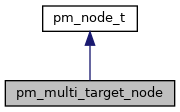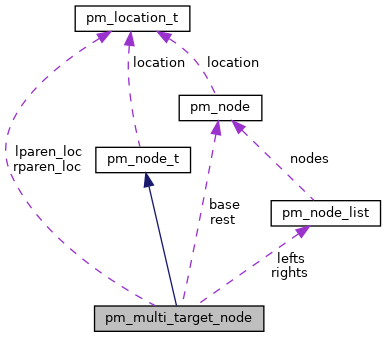MultiTargetNode. More...
#include <ast.h>


Data Fields | |
| pm_node_t | base |
| The embedded base node. | |
| struct pm_node_list | lefts |
| MultiTargetNode::lefts. | |
| PM_NODE_ALIGNAS struct pm_node * | rest |
| MultiTargetNode::rest. | |
| struct pm_node_list | rights |
| MultiTargetNode::rights. | |
| pm_location_t | lparen_loc |
| MultiTargetNode::lparen_loc. | |
| pm_location_t | rparen_loc |
| MultiTargetNode::rparen_loc. | |
 Data Fields inherited from pm_node Data Fields inherited from pm_node | |
| pm_node_type_t | type |
| This represents the type of the node. | |
| pm_node_flags_t | flags |
| This represents any flags on the node. | |
| uint32_t | node_id |
| The unique identifier for this node, which is deterministic based on the source. | |
| pm_location_t | location |
| This is the location of the node in the source. | |
Detailed Description
MultiTargetNode.
Represents a multi-target expression.
a, (b, c) = 1, 2, 3 ^^^^^^
This can be a part of MultiWriteNode as above, or the target of a for loop
for a, b in [[1, 2], [3, 4]]
^^^^
Type: PM_MULTI_TARGET_NODE
Field Documentation
◆ lefts
| struct pm_node_list pm_multi_target_node::lefts |
MultiTargetNode::lefts.
Represents the targets expressions before a splat node.
a, (b, c, *) = 1, 2, 3, 4, 5
^^^^
The splat node can be absent, in that case all target expressions are in the left field.
a, (b, c) = 1, 2, 3, 4, 5
^^^^
◆ rest
| PM_NODE_ALIGNAS struct pm_node* pm_multi_target_node::rest |
MultiTargetNode::rest.
Represents a splat node in the target expression.
a, (b, *c) = 1, 2, 3, 4
^^
The variable can be empty, this results in a SplatNode with a nil expression field.
a, (b, *) = 1, 2, 3, 4
^
If the * is omitted, this field will contain an ImplicitRestNode
a, (b,) = 1, 2, 3, 4
^
◆ rights
| struct pm_node_list pm_multi_target_node::rights |
MultiTargetNode::rights.
Represents the targets expressions after a splat node.
a, (*, b, c) = 1, 2, 3, 4, 5
^^^^
◆ lparen_loc
| pm_location_t pm_multi_target_node::lparen_loc |
MultiTargetNode::lparen_loc.
The Location of the opening parenthesis.
a, (b, c) = 1, 2, 3 ^
◆ rparen_loc
| pm_location_t pm_multi_target_node::rparen_loc |
MultiTargetNode::rparen_loc.
The Location of the closing parenthesis.
a, (b, c) = 1, 2, 3
^
The documentation for this struct was generated from the following file:
- include/prism/ast.h